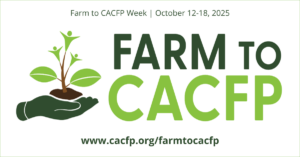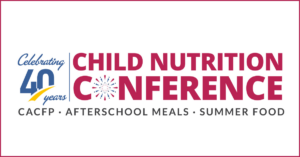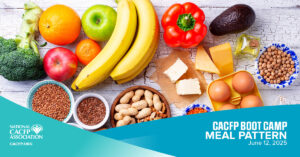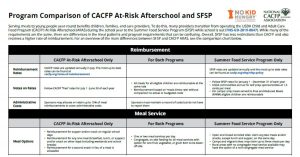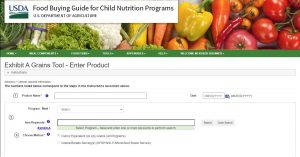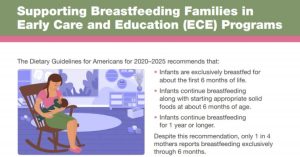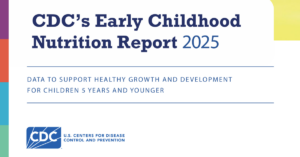Farm to CACFP connects providers to local food producers with the objectives of serving locally-grown foods and providing nutrition education. Check out these upcoming events at NCA!
Read MoreUSDA released their second report on the Study of Nutrition and Activity in Child Care Settings (SNACS-II), which follow their first in 2022. SNACS-II uses data from program year 2022-23 to assess how well children’s diets and CACFP meals align with the Dietary Guidelines for Americans.
Read MoreThe USDA released a memorandum rescinding 2022 guidance regarding the interpretation of discrimination based on “sex.” The 2022 guidance redefined the definition of “sex” to include gender identity and sexual orientation. Therefore, the rescission of this guidance will revert USDA’s definition back to its previous interpretation and omit mention of gender identity and sexual orientation.
Read MoreIs formula made for toddlers creditable in the CACFP?
Read MoreGet a rundown on all things happening at NCA this month!
Read MoreUSDA has the authority to waive statutory or regulatory program requirements for Child Nutrition Programs. State Agencies can submit a 12(l) waiver application to USDA in order to allow for flexibilities, including off-site monitoring, in their state. In Fiscal Year 2025, at least nine States have applied and been approved for an off-site monitoring waiver.
Read MoreFarm to CACFP connects providers to local food producers with the objectives of serving locally-grown foods and providing nutrition education. Check out these upcoming events at NCA!
Read MoreThe National CACFP Association (NCA) proudly announces the 2026 National Child Nutrition Conference (NCNC26), celebrating 40 years of advancing nutrition in child and adult care settings across the country.
Read MoreThe National CACFP Association (NCA) is reaffirming its commitment to continuing education by offering a variety of virtual training opportunities that support child nutrition professionals at every stage of their careers.
Read MoreServing reimbursable meals begins with a solid understanding of the CACFP meal pattern. Learn more with our Meal Pattern Boot Camp!
Read MoreGet a rundown on all things happening in May at NCA. Annual Training is happening this month. Don’t miss out!
Read MoreThe USDA released a memorandum rescinding 2022 guidance regarding the interpretation of discrimination based on “sex.” The 2022 guidance redefined the definition of “sex” to include gender identity and sexual orientation. Therefore, the rescission of this guidance will revert USDA’s definition back to its previous interpretation and omit mention of gender identity and sexual orientation.
Read MoreUSDA has the authority to waive statutory or regulatory program requirements for Child Nutrition Programs. State Agencies can submit a 12(l) waiver application to USDA in order to allow for flexibilities, including off-site monitoring, in their state. In Fiscal Year 2025, at least nine States have applied and been approved for an off-site monitoring waiver.
Read MoreNorth Carolina Governor’s Task Force on Child Care and Early Education analyze child care budgets to evaluate how to improve pay for early childhood educators.
Read MoreThe White House released the President’s Budget for Fiscal Year 2026, which includes cuts to discretionary spending for Child Nutrition Programs (CNPs). While the budget maintains full funding for Child Nutrition Programs, like the CACFP and SFSP, the cuts to discretionary spending include the Patrick Leahy Farm to School Grant and the Institute for Child Nutrition (ICN), a National Ally of NCA.
Read MoreThe CACFP has many benefits – it supports child care providers and ensures that children and adults in care receive nutritious meals. The CACFP is also critical in supporting working families and supporting the development of young children into successful adults.
Read MoreThe USDA released a memorandum stating that they support and encourage states and school districts to experiment with meals to provide interesting, healthy, and diverse meals.
Read MoreThe Child and Adult Care Food Program has new creditable foods listed on the USDA Food Buying Guide! If you are new to the FBG, this interactive tool allows for easy display, search, and navigation of food yield information. In addition, users can compare yield information, create a favorite foods list, and access tools, such as the Recipe Analysis Workbook (RAW) and the Product Formulation Statement Workbook.
Read MoreThe Child and Adult Care Food Program community asked for more Spanish resources to be available on the National CACFP Sponsors Association website and we heard you! Available now in Spanish are more resources to help sponsors and providers with meal pattern requirements, best practices, and so much more!
Read MoreServing meals to young people year-round benefits children, families, and care providers. To do this, many providers transition from operating the USDA Child and Adult Care Food Program (CACFP) At-Risk Afterschool (ARAS) during the school year to the Summer Food Service Program (SFSP) while school is out. For an overview of the main differences between SFSP and CACFP ARAS, see the comparison chart below.
Read MoreNCA understands that the end of flexibilities will cause challenges for many CACFP sponsors and providers and we commend your continued commitment to providing nutritious meals and snacks to the children or adults in your care. In preparation for the end of the additional reimbursement, we have collected the following resources to help you successfully provide meals even if your available budget decreases.
Read MoreCDC created three new fact sheets for Early Care and Education (ECE) providers about Early Child Nutrition and Feeding. The fact sheets offer tips and best practices for supporting breastfeeding families, information about safe storage and handling of breastmilk, and strategies for introducing solid foods.
Read MoreIs formula made for toddlers creditable in the CACFP?
Read MoreIf a grain product list enriched grains as the first ingredient, is the product creditable in the CACFP?
Read MoreCan a mixed age group of 1- and 2-year-olds all be served unflavored 1% milk in the CACFP?
Read MoreAre vegetable spirals creditable in the CACFP?
Read MoreCan a provider serve yogurt that they have frozen?
Read MoreCan a pureed vegetable that is mixed into a dish credit towards the meal pattern?
Read MoreThe Child and Adult Care Food Program has new creditable foods listed on the USDA Food Buying Guide! If you are new to the FBG, this interactive tool allows for easy display, search, and navigation of food yield information. In addition, users can compare yield information, create a favorite foods list, and access tools, such as the Recipe Analysis Workbook (RAW) and the Product Formulation Statement Workbook.
Read MoreThe Child and Adult Care Food Program community asked for more Spanish resources to be available on the National CACFP Sponsors Association website and we heard you! Available now in Spanish are more resources to help sponsors and providers with meal pattern requirements, best practices, and so much more!
Read MoreServing meals to young people year-round benefits children, families, and care providers. To do this, many providers transition from operating the USDA Child and Adult Care Food Program (CACFP) At-Risk Afterschool (ARAS) during the school year to the Summer Food Service Program (SFSP) while school is out. For an overview of the main differences between SFSP and CACFP ARAS, see the comparison chart below.
Read MoreNCA understands that the end of flexibilities will cause challenges for many CACFP sponsors and providers and we commend your continued commitment to providing nutritious meals and snacks to the children or adults in your care. In preparation for the end of the additional reimbursement, we have collected the following resources to help you successfully provide meals even if your available budget decreases.
Read MoreCDC created three new fact sheets for Early Care and Education (ECE) providers about Early Child Nutrition and Feeding. The fact sheets offer tips and best practices for supporting breastfeeding families, information about safe storage and handling of breastmilk, and strategies for introducing solid foods.
Read MoreUSDA released their second report on the Study of Nutrition and Activity in Child Care Settings (SNACS-II), which follow their first in 2022. SNACS-II uses data from program year 2022-23 to assess how well children’s diets and CACFP meals align with the Dietary Guidelines for Americans.
Read MoreA recent study by our partners at Child Care Aware® of America reveals that parents across the nation are struggling to find affordable, high-quality child care. The survey shows that parents are piecing together multiple care arrangements and facing challenges balancing work and caregiving.
Read MoreThe CDC’s 2025 Early Childhood Nutrition Report gives us a big-picture look at how young children in the U.S. are eating and growing. It focuses on kids from birth to age 5 and shares important facts about breastfeeding, starting solid foods, eating healthy and how states support good nutrition.
Read MoreThe “Characteristics of Emergency Shelters Participating in the CACFP” study by USDA seeks to better understand the characteristics of CACFP emergency shelters, who they serve, how CACFP fits into their operations, and their challenges with CACFP. The study was conducted in 2023 and collected data from 242 emergency shelters that participate in CACFP in Fiscal Year 2023.
Read MoreA survey was administered in the spring of 2023 of licensed California family child care homes (FCCH) to assess the perceived impacts of the increased reimbursement during the Covid-19 pandemic on CACFP participation and anticipated challenges with reinstated tiered rates.
Read MoreThe USDA recently released a study on the “Characteristics of Adult Day Care Centers that Participate in the USDA’s Child and Adult Care Food Program” which seeks to better understand key characteristics of adult day care centers participating in CACFP.
Read More
